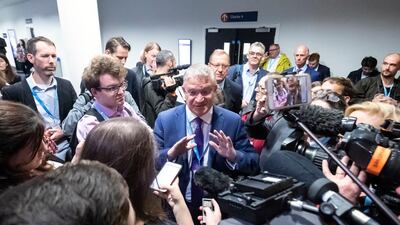A senior British politician has demanded international action to prevent extremists taking advantage of the coronavirus crisis to “exploit” vulnerable people.
Andrew Rosindell has raised his concerns at the highest level of British government, asking ministers to answer questions over the rise in Muslim Brotherhood activities as a result of the pandemic
There are fears that the extremist movement has taken advantage of the Covid 19 pandemic to spread its influence.
Mr Rosindell, a Conservative, wants answers from his government colleagues over the increased activity in Britain and internationally by extremist sympathisers.
Mr Rosindell, 54, asked Home Secretary Priti Patel for her assessment of the Muslim Brotherhood's activity in Britain as a result of the economic downturn.
He also asked Dominic Raab, the Foreign Secretary, for an evaluation of the “global economic downturn on trends in the level of recruitment by the Muslim Brotherhood overseas”.
Mr Rosindell told The National that there needed to be a global effort to investigate and battle extremist networks using the pandemic to target "vulnerable people".
“All governments must act now to monitor and counter activities by extremist organisations such as the Muslim Brotherhood and organisations they control or influence, which may be exploiting the Covid-19 crisis to target vulnerable people and communities,” he said.
There are increased worries that the Brotherhood is growing in influence in Britain despite its close ties to miltant groups such as Hamas in the Gaza Strip.
Last year the US considered designating the Muslim Brotherhood a terrorist organisation.
Mr Rosindell has long been calling for a ban on radical organisations who use the country as a base to raise funds and radicalise Muslims through community-based organisations and institutions.
“I think we have been far too soft for far too long,” he told the Conservative Party Conference in 2014.
"I think if we were to take action it would not only be the right thing to do, but also the popular thing to do.
"It would show that the Conservative government is not going to tolerate such criminality within our own shores.
“We should take much firmer action and if necessary ban individuals and organisations from operating in this country.”
Mr Rosindell’s questions came after reports that there has been a 50 per cent drop in the number of referrals to Prevent, the organisation set up to de-radicalise extremists.
In recent years there has been a rise in terrorism in Britain, with fatal attacks in London and Manchester.
Leading Brotherhood sympathisers in the UK have been prominent in campaigns against Britain's major counter-extremism programme, the Prevent strategy.
There has also been alarm at the Brotherhood’s influence over the Muslim Council of Britain, an umbrella body of more than 500 Islamic organisations, which claims to be non-sectarian.
The Brotherhood has exerted “significant influence” on the council and the Muslim Association of Britain, a government report said.
The inquiry led by Sir John Jenkins, a former British ambassador to Saudi Arabia and Iraq, was set up to look at how the movement's culture of secrecy made its influence in civil bodies hard to track.
But the government has never published in full the findings of the 2015 report on the Muslim Brotherhood, which was commissioned by former prime minister David Cameron.
Last month, Mr Rosindell, MP for Romford, Essex, asked about the possible links between the European Institute of Human Sciences and the Brotherhood.
The Home Office responded that it “keeps under review the views promoted and activities undertaken by the Muslim Brotherhood’s associates in the UK”.
There are growing concerns in Whitehall over increased Brotherhood influence after a relaxation on rules governing official contact between the Home Office and the Muslim Council of Britain.
The Home Office and Foreign Office have seven days to respond to Mr Rosindell’s questions.



